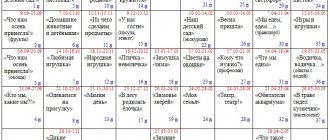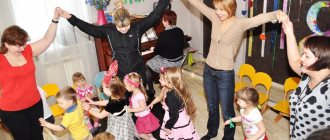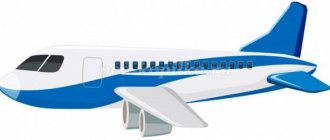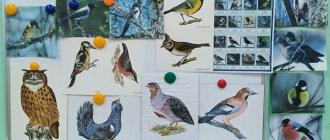Planning educational activities on weekly topics for the year in the middle group
Anastasia Shipenok
Planning educational activities on weekly topics for the year in the middle group
Planning educational activities on weekly topics for the year in the middle group
1. Our favorite kindergarten
Program content: Summarize and systematize children’s knowledge about kindergarten: its name, kindergarten premises (music room, gym, laundry room, kitchen, teaching room, etc.). Foster love for your kindergarten.
Dictionary: Kindergarten “Thumbelina”
, music room, gym, laundry, kitchen, teaching room, manager's office, clerk's office
2. Professions in kindergarten
Program content: To form ideas about kindergarten employees (nanny, janitor, laundress, music director, physical education instructor, nurse, etc., about the labor processes performed by each of them, tools; develop children’s cognitive interest in the work of adults in kindergarten garden; cultivate a respectful attitude towards the work of adults, a desire to provide all possible assistance.
Vocabulary: Nanny, teacher, janitor, laundress, music director, physical education instructor, nurse, manager.
3. Houseplants
Program content: Learn to compare plant leaves according to the following characteristics: color, shape, size. The nature of the surface, the number of leaves; consolidate the ability to use models; consolidate knowledge of the structure of the labor process for caring for indoor plants; cultivate an attitude towards plants as living beings.
Vocabulary: Geranium, balsam, root, stem, leaf, flower, soil nutrition, light, heat, moisture.
4. Vegetable garden. Vegetables.
Program content: To form ideas about vegetables, their place of growth, and essential features.
Vocabulary: Vegetables, garden
5. Garden. Fruits
Program content: Clarify and consolidate preschoolers’ ideas about fruits that differ from each other in appearance and method of growth
Vocabulary: Garden, fruit
6. Forest.
Program content: Expand children's knowledge about vegetation during the autumn period, introduce them to the distinctive features of the color of trees: birch, maple. Expand knowledge about mushrooms and berries. To cultivate a sense of joy, love for nature, a desire to preserve and care for it. Draw children's attention to the beauty of the autumn landscape.
Vocabulary: Forest, trees, berries, mushrooms
7. Autumn
Program content: Expand children's understanding of the characteristic signs of autumn. Seasonal changes in the life of animals and plants. Connect clothing with the time of year.
Vocabulary: Golden autumn, preparing animals for winter, changing coat color, cooking at home, storing food
8. Home Family
Program content: Form the concept of home, family, family relationships. Develop ethical standards of communication and behavior. Strengthen family relationships: the ability to name family members, show care and love for relatives.
Vocabulary: Home, family, kinship relationships
9. City. Streets
Program content: To clarify preschoolers’ knowledge about the name of their hometown, streets, its main attractions, famous people. Introduce the history of the city. Cultivate love for your hometown.
Dictionary: City of Sosnovoborsk, pine forest, attractions, factories.
10. Transport. Traffic rules
Program content: To introduce children to types of transport, to form in children ideas about the purpose of some vehicles ( truck, bus, trolleybus)
and about the driver’s profession; clarify children's knowledge about the rules of behavior in public transport and basic traffic rules.
Dictionary: water, air, ground underground transport, cars, trucks, traffic rules, signs.
11. Our Motherland is Russia. State symbols.
Program content: To give children an idea of the Motherland - Russia, its capital. To consolidate knowledge about the nature of Russia, about the Russian national costume, about Russian folk tales, nursery rhymes. Introduce state symbols (flag)
. To cultivate love for one’s Motherland, to evoke a feeling of admiration for the beauty of Russian nature and the talent of the Russian people.
Dictionary: Motherland - Russia, Russian national costume, capital - Moscow, state symbols - flag
12. Winter. Nature in winter. Cloth. Shoes. Hats.
Program content: To form in preschoolers ideas about the seasons: winter. Encourage children to name the main signs of winter. Establish simple connections between the seasons and the weather. Summarize and systematize children’s ideas about the adaptation of plants to seasonal phenomena. Summarize knowledge about how animals spend the winter and what they eat. Connect clothing with the time of year.
Vocabulary: Winter (December, January, February, plants stop growing, hare, squirrel change coat color, bear hibernates
13. Wintering birds
Program content: To give children an idea of the types of food of wintering birds. Reinforce the concept of “wintering”
birds. Learn to recognize birds by their modes of movement and the sounds they make. Cultivate a caring and friendly attitude towards birds.
Vocabulary: “wintering birds”
; food, feeding trough, hibernate, ruffled, chirping, chirping, covered in fluff.
14. Wild animals
Program content: Expand and clarify ideas about the appearance, lifestyle and habits of wild animals. Encourage children to recognize and name animals living in the forest. Determine how the change of seasons affects the life of animals. Develop a caring attitude towards animals in children
Vocabulary: wild animals, live in the forest, take care of themselves, get their own food.
15.New Year
Program content: To form children's ideas about the New Year holiday and the purpose of Christmas tree decorations. Clarify children's knowledge about the rules of behavior at matinees. Induce an emotionally positive attitude towards the upcoming holiday.
Vocabulary: New Year, Christmas tree decorations
16. Winter fun.
Program content: Winter fun, snow, snowman, sledding, slide
Dictionary: Summarize and systematize children's knowledge about winter fun.
17. Pets
Program content: Form ideas about domestic animals: What they are fed, how they are cared for, what benefits they bring. Clarify ideas about adult animals and their young. Cultivate an interest in pets
Vocabulary: Pets, live next to humans; cow-calf, horse-foal, sheep-lamb
18. Emotional states of children and adults
Program content: To form children's ideas about the various emotional states of children and adults, the ability to communicate with adults and peers; cultivate a desire to give joy and good mood to loved ones
Dictionary: Emotions: joy, sadness, anger, indifference, etc.
19. Tools. Appliances.
Program content: To form ideas about household appliances, tools widely used at home and in kindergarten; about the importance of their use to speed up the production of results, improve its quality, and facilitate human labor; cultivate a caring attitude with household appliances
Vocabulary: Tools, household appliances, speed up the production of results, improve its quality. Makes people's work easier
20. Professions of dads
Program content: Clarify children's ideas about the profession of fathers and grandfathers; about the military profession; instill in children a desire to please their father (grandfather)
joy.
Vocabulary: driver, driver, pilot, machinist
21. Russian army. Defenders of the Fatherland.
Program content: Introduce children to the national holiday Defender of the Fatherland Day. Form the concepts of military air, land and sea transport. Differentiate professions by branch of the military. Introduce preschoolers to Russian festive culture. To evoke a feeling of pride and joy that grandfather and father served in the army and defended our Fatherland and us.
Dictionary: Defender of the Fatherland Day, military air, land and sea transport, cap, peakless cap, border, tank crews, sailors, border guards, pilots.
22. Professions of mothers
Program content: To form children’s ideas about the work and professions of their mothers and women in kindergarten; to cultivate a desire to provide all possible assistance to the mother, to take care, to bring joy with her actions and actions.
Vocabulary: Seller, hairdresser. doctor, teacher. cook
23. Mom's holiday
Program content: Introduce children to the national holiday International Women's Day.
Vocabulary: International Women's Day
24. Furniture
Program content: Form children's ideas about furniture, its functions and properties; the quality of the materials from which it is made; about how a person creates and transforms pieces of furniture ; develop the ability to identify and name some parts of furniture, their shape, size.
Vocabulary: Furniture, armchair, sofa, bed, table, chairs, wardrobe, furniture store
25. Dishes
Program content: To form children's ideas about the type of tableware, its purpose, qualities and properties, materials for making tableware, and the connection between the material and the purpose of the tableware. Summarize children’s ideas about the decorative and applied arts of Russia (dish painting)
;
Dictionary: kitchen, dining room, tea room; tea-set; tablecloth; samovar; refreshments, painting dishes.
36. Toys. Dymkovo, Filiminovo, Kargopol toy.
Program content: To form ideas about some types of Russian folk arts and crafts: toys made of clay (Dymkovo, Filimonovskaya, Kargopol, toys made of wood (Russian nesting doll)
. Tell about their history, the characteristic features of the painting. To cultivate a love for the decorative and applied arts of our Motherland.
Dictionary: Decorative and applied arts, Dymkovo, Filimonov, Kargopol toys, clay toys. Russian doll
27. Spring. Nature in spring. Clothes, shoes, hats.
Program content: To form generalized ideas about spring as a season. To consolidate children's knowledge about spring changes in living and inanimate nature. Introduce seasonal changes in the life of wild animals. Connect clothing with the time of year. To foster a joyful, caring attitude in children towards awakening nature.
Vocabulary: Spring, spring months: March, April, May; signs of spring: it becomes warm, the snow melts, trees wake up, flowers appear; sun, stream, icicle, flowers. In animals - molting, the end of hibernation, caring for offspring.
28. Space
Program content: Introduce children to the globe, planet Earth , spaceships. Introduce the concept of space. To consolidate knowledge of the astronaut profession.
Vocabulary: Planet Earth , space, astronaut, spaceships
28. Migratory birds
Program content: Summarize children's knowledge about migratory birds, their habits, lifestyle ; teach children to correlate changes in nature with the life of birds in the forest in the spring; develop in children a cognitive interest in the life of feathered friends.
Vocabulary: “nest”, “chirp”, “migratory”, “wintering”, “chirp”.
30. Insects
Program content: To consolidate children's ideas about insects, teach them to identify their main features, and develop knowledge about them. How insects protect themselves from enemies. Develop the ability to compare, identify common and distinctive features of insects.
Vocabulary: Insects: butterfly, beetle. Segmented body structure, wings, antennae, six legs
31. Pisces
Program content: Clarify and expand children's ideas about fish.
Vocabulary: Fish, caviar, fry, fisherman, (Fish, head, tail, fins, scales, body)
.
32. Victory Day. Heroes of the Great Patriotic War.
Program content: Teach children to remember the heroic past of the Russian people. Enrich children's knowledge about the great and bright holiday - Victory Day. To instill in them patriotic feelings, the desire to be like those soldiers who defended our Motherland.
Dictionary: Victory Day, Great Patriotic War, heroes, awards
33. Summer
Program content: To form in children generalized ideas about summer, as a season, and the signs of summer. Expand general understanding of the influence of the body of sunlight on the lives of people, animals and plants. Connect clothing with the time of year.
Vocabulary: Summer, nature “blooms”
, the sun is baking, flowers are blooming and berries are ripening, summer is the time for flowers, warmth and plenty of food. Animals and birds build nests and burrows and breed offspring.



